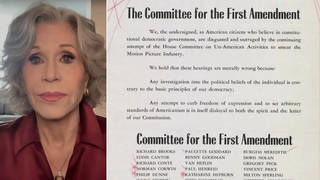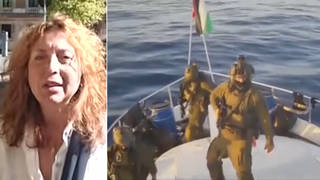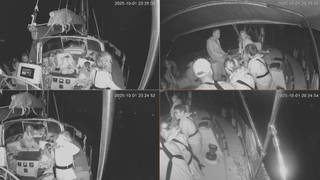
Guests
- Steve Fainaruforeign correspondent for The Washington Post, specializing in private security issues. Read Steve’s article How Blackwater Sniper Fire Felled 3 Iraqi Guards.
Steve Fainaru of The Washington Post discusses his new account of the February killings. After a brief investigation, the U.S. government concluded that the actions of Blackwater fell within approved rules governing the use of force, but the Iraqi police described the shootings as an “act of terrorism.” [includes rush transcript]
Transcript
JUAN GONZALEZ: Legal and political woes continue for the private military firm Blackwater. Iraq’s interior minister announced this week he would authorize raids against Western military firms to ensure compliance with Iraqi weaponry laws. Scrutiny of the private military industry in Iraq has peaked following the killing of 17 Iraqis by Blackwater guards in September.
Meanwhile, here in the United States, the Bush administration has shown its first audible signs of distancing itself from Blackwater. On Tuesday, the White House quietly missed a deadline to weigh in on a wrongful death case brought by families of three American servicemembers who died when a Blackwater aircraft crashed in Afghanistan. Blackwater CEO Erik Prince, a major Republican donor, said, “After the President has said that as commander-in-chief he is ultimately responsible for contractors on the battlefield, it is disappointing that his administration has been unwilling to make that interest clear before the courts.”
AMY GOODMAN: Meanwhile, The Washington Post has revealed new details of a little-noticed killing by Blackwater operatives in Iraq earlier this year. It was February 7th, Blackwater forces shot dead three guards working for the state-funded Iraqi Media Network in Baghdad. An Iraqi police report described the shootings as an “act of terrorism.” The police concluded Blackwater opened fire without any provocation. But the U.S. government concluded the actions of the Blackwater operatives fell within approved rules governing the use of force.
The Iraqi Media Network sought to sue Blackwater in an Iraqi court, but an Iraqi judge rejected the petition, citing a 2004 law signed by L. Paul Bremer, the former head of the U.S. occupation. To date, neither Blackwater nor the U.S. embassy have apologized or paid any compensation to the victims’ families.
Steve Fainaru is the Washington Post reporter who wrote this new account of the February killings. We welcome you to Democracy Now!, Steve.
STEVE FAINARU: Thanks very much. Thanks for having me.
AMY GOODMAN: And we also contacted Blackwater to invite them on the program, but they didn’t respond to our requests. Steve, can you lay out how you pieced together what happened last February?
STEVE FAINARU: Sure. The incident happened in the morning of February 7. The Blackwater team was escorting a member of the — a U.S. embassy diplomat to the Ministry of Justice, which is across the street from the Iraqi Media Network compound. When the Blackwater team got to the ministry, they set up some of their people in sniper positions on the roof of the ministry, which overlooks the interior of the IMN compound. Across the street, the IMN, which is a state-supported complex, they had their own guards who were set up, some of whom were set up in an abandoned building inside the complex, but also overlooking a sort of square that is in between the two buildings.
At some point, one of the Blackwater snipers perceived or seems to have perceived one of those guards as a threat and opened fire and shot and killed one of the guards who was on a landing that was overlooking the square but also below the Justice Ministry roof. When that guard was shot, a number of the guard’s colleagues rushed to his side. When that happened, another guard was shot and killed.
The Iraqis went out to try to confront Blackwater and try to figure out what was going on. It was chaos, but over a short period of time, the Justice Ministry alerted the IMN guard team and also an Iraqi army company that has jurisdiction over that neighborhood that it was the private security company that was doing the shooting. They tried to confront Blackwater before they left, according to them, and Blackwater was unresponsive and then basically exited the area, dropping smoke grenades for cover as they left and returned to the Green Zone.
When the Iraqis went back inside the compound, they were looking for another guard who was actually the armor, the keeper of the weapons for the security guard staff, and they couldn’t find him. And when they — one of the guards returned to the balcony, where the other two guards had been shot, they found this third guard dead on the same location.
JUAN GONZALEZ: Now, Steve, in your investigation, obviously, you went at it many months later, but you found that virtually none of the witnesses had actually been interviewed by any American investigators about what actually happened?
STEVE FAINARU: Yeah, I think that was the thing that was most striking. You know, it’s still very unclear sort of what precipitated the shooting. You know, the Iraqi guards — I mean, we interviewed, you know, probably two dozen people inside that compound, and no one said that the Iraqi guards had fired first. Blackwater, of course, reported to the embassy that they had come under fire and responded with targeted rounds.
But what I think was most striking is that there was no real investigation that occurred on behalf of the U.S. embassy’s Regional Security Office, which is responsible for overseeing Blackwater. And, you know, their position was that they had conducted extensive interviews with the Blackwater team. They didn’t really explain why they had never returned to the scene where it had taken place to try to interview witnesses, but that had not happened. There wasn’t any real investigation that occurred. Now, the embassy claimed that there were other people who were interviewed, in terms of their own inquiry or review, but it was never entirely clear who those people were.
JUAN GONZALEZ: And what was the impact of this shooting on the employees of the Iraqi Media Network? Obviously, this is a government-supported media network, so it wouldn’t be antagonistic necessarily to the U.S. occupation.
STEVE FAINARU: Well, in fact, it’s the opposite, because the network itself, you know, the flagship station of the network — it’s a big media company, and the flagship station, Iraqiya, is one of the largest television networks in Iraq. And it was effectively relaunched by the United States after the invasion as sort of a symbol for the new democracy and new freedoms in Iraq. It essentially took the place of the state-run Saddam propaganda network. So there — inside the network, I think there was a feeling that they had, you know, a good relationship with many people, you know, in the embassy.
You know, the impact was significant. I mean, people — as at least it was described to us, you know, people were — you know, at least initially, no one was certain what had happened. And I think that was another thing that was striking, you know, that the Blackwater team was firing from one Iraqi government building into another Iraqi government building. And so, when the guards were shot, the last thing that anybody thought was that they were under fire from the Justice Ministry. You know, no one could really figure out what was going on. There was a — the thought was that they were actually under attack from insurgents, from somewhere surrounding the neighborhood, from, you know, insurgent snipers. And so, there was a lot of confusion and panic surrounding sort of where the shooting was coming from, because it was inconceivable that the Justice Ministry would be firing on them.
And then, you know, I think there was a great deal of frustration, because I think there was a feeling, at least as it was described to us, of frustration that it was unclear why this had happened and that there was not really much of a response coming from the United States government.
AMY GOODMAN: And now, what is happening now, after the September 16th incident, attack by the Blackwater forces in Baghdad have opened up this whole question of responsibility and culpability?
STEVE FAINARU: Well, with regard to this specific incident or more generally?
AMY GOODMAN: In regard to this specific attack, is it being re-looked at?
STEVE FAINARU: Well, as in before yesterday, no, not really. I mean, we had looked into it because — really, we were interested in it — but we’ve been covering the private security issue all year — and we were interested in it because we wanted to try to find out — we were aware that an incident had taken place, but only sort of generally, that it was one of the incidents that the Iraqi Ministry of Interior had brought to the embassy to try to figure out what had happened and see if the Americans would respond. So the goal was to find out what happened and what, if any, response there was on behalf of the Americans.
So, you know, in terms of what’s going on with it now, it’s not totally clear. You know, there is a joint Iraqi commission that has been set up that’s addressing private security matters in the wake of the September 16th Nisoor Square incident. And so, that commission is supposed to, among other things, look into previous incidents, presumably this one, although it was — it’s not clear to us that this specific incident is on the agenda of that commission. So I think it’s the hope of the Iraqi Media Network that some resolution will occur, whether it’s, you know, compensation or clarification for why the shooting took place, you know, an actual investigation. But up to now, nothing has really happened.
AMY GOODMAN: Well, Steve Fainaru, we’ll leave it there, but we’ll continue certainly to cover this overall issue of these companies in Iraq and what their responsibility, culpability is, under whose laws do they operate. Thanks for joining us.












Media Options